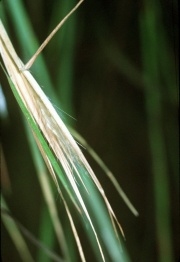Difference between revisions of "Broomsedge"
Jump to navigation
Jump to search
(username removed) |
(username removed) |
||
| Line 12: | Line 12: | ||
* ''The American Heritage Dictionary'' or ''Encarta'', via Microsoft Bookshelf 98, Microsoft Corp., 1998 | * ''The American Heritage Dictionary'' or ''Encarta'', via Microsoft Bookshelf 98, Microsoft Corp., 1998 | ||
| − | * ''Encyclopedia Britannica'', http://www.britannica.com Comment: "Bluestem." | + | * ''Encyclopedia Britannica'', http://www.britannica.com Comment: "Bluestem." Encyclopædia Britannica. 2004. Encyclopædia Britannica Premium Service. 20 May 2004 . |
[[Category:Materials database]] | [[Category:Materials database]] | ||
Revision as of 06:42, 24 July 2013
Description
A yellow dye obtained from a wild grassy type plant (Andropogon virginicus) found in open fields from Massachusetts to Texas. The entire broomsedge plant, stalk, and leaves is gathered and dried. Broomsedge is also called dyer's broom because of similar dye colors. It produces of light greenish yellow on wool with an aluminum mordant and a brass color with a chrome mordant. Broomsedge gives a bright yellow to golden color to cotton. It is sometimes overdyed with indigo or henna to produce green or orange, respectively.
Synonyms and Related Terms
dyer's broom; Andropogon virginicus (broomsedge bluestem); erba della pampa (It.); broom sedge; blue stem; bluestem;
Authority
- The American Heritage Dictionary or Encarta, via Microsoft Bookshelf 98, Microsoft Corp., 1998
- Encyclopedia Britannica, http://www.britannica.com Comment: "Bluestem." Encyclopædia Britannica. 2004. Encyclopædia Britannica Premium Service. 20 May 2004 .
